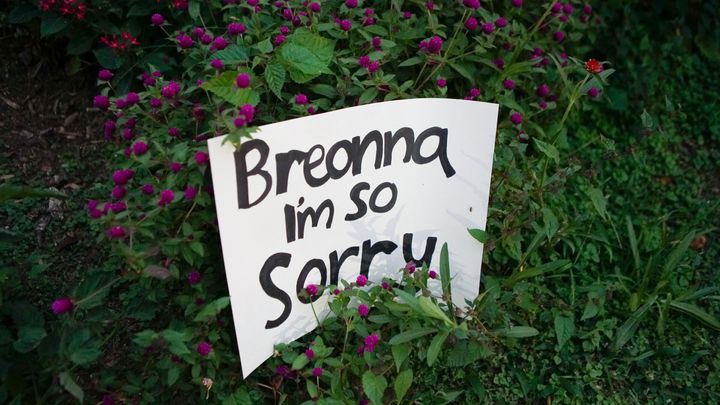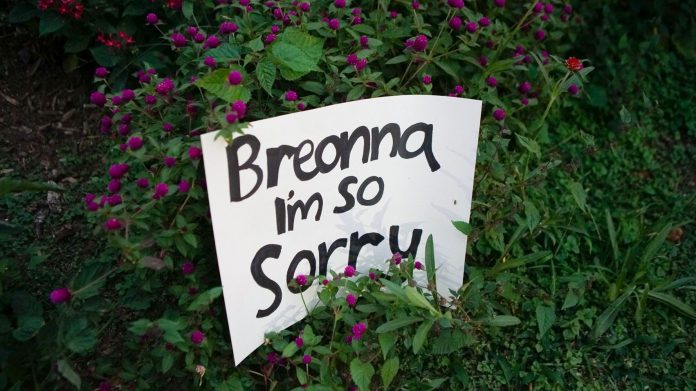[ad_1]
Roughly 4 in 10 registered voters say the grand jury decision on the fatal shooting of Breonna Taylor by police in Kentucky was too lenient on the police, a new HuffPost/YouGov poll finds. At the same time, the survey finds, levels of concern about police brutality have dipped since June, as has support for the protests such instances have inspired.
A grand jury in Louisville, Kentucky, indicted one police officer in the case of the shooting death of Taylor, charging him with three counts of first-degree wanton endangerment. No charges were filed against the other two police officers who were at the scene the night Taylor was fatally shot. No murder charges were filed against any of the police officers.
A 41% plurality of voters called this result too lenient on the officers, with 28% saying it was about right, 9% saying it was too harsh, and the remainder unsure. Only 21% of voters say they were following the story about these charges very closely, with just shy of 60% saying they were following it at least somewhat closely.
When the death of George Floyd brought protesters to the streets in June, they were greeted by an unusual wave of public support. In three HuffPost/YouGov surveys conducted in late May through June, support for the protests responding to Floyd’s death averaged 54% among registered voters, with just 29% opposed and the remainder neutral or unsure. In surveys taken in July, August and September, a similar question about support for “recent anti-racism protests” found voters’ support sinking below the 50% mark. In the most recent poll, 40% say they support such anti-racism protests, with 37% opposed.
There has also been a modest drop in the share of voters that sees police brutality as a very serious problem in the U.S. ― only 32% now do, compared to 43% who said the same in a HuffPost/YouGov survey conducted in late May and early June.

These findings track with those of other polls that find waning support for both the protests and the causes they espouse, often especially among white Americans and Republicans. Support for the Black Lives Matter movement dropped 12 points between June and September, according to Pew Research, a change due largely to declining support among white and Hispanic adults. In June, 37% of white Republicans expressed at least some support for Black Lives Matter, the poll found, while in September just 16% did. Tracking data from the Democratic firm Civiqs charts a similar erosion of support for the movement since its peak in June. In recent AP-NORC polling, meanwhile, 39% of Americans said they approved of protests responding to police violence against Black Americans, down from 54% in June.
“[F]rom the moment that topic is raised to awareness, the clock starts ticking with regards to, ‘How quickly can we resolve this so I can get back to my normal life?’” University of Michigan political scientist Christian Davenport told The Associated Press, citing a pattern of “compassion fatigue” in white Americans’ response to social justice movements.
Concerns about racial inequality in policing and criminal justice systems haven’t entirely receded. Voters say, 49% to 36%, that Black Americans and other minorities do not receive equal treatment with white Americans in the criminal justice system, the latest HuffPost/YouGov poll finds. By 44% to 37%, they disagree that police in most cities treat Black residents as fairly as white ones.
Overall opinions of the police, which were broadly positive in the summer, have remained so. Two-thirds of voters currently say they have a favorable opinion of police officers in the United States, and 72% that they have a favorable opinion of their own community’s police officers.
Joe Biden offered similar sentiments during Tuesday’s debate. He cited “a systemic injustice in this country, in education, in the law enforcement and the way in which it’s enforced.”
“The vast majority of police officers are good, decent honor men and women,” he said, adding that peaceful protests were appropriate in response to police brutality, but that violence was not.
“What is peaceful protest?” President Donald Trump responded. “When they run through the middle of town and burned down your stores and kill people all over the place?”
In the HuffPost/YouGov poll, taken prior to the debate, registered voters were about evenly split on Trump’s response to the anti-racism protests, with 45% approving, 46% disapproving and 9% unsure. Biden received less positive reviews, with 36% approving, 43% disapproving, and 21% unsure.
Use the widget below to further explore the results of the HuffPost/YouGov survey, using the menu at the top to select survey questions and the buttons at the bottom to filter the data by subgroups:
Past HuffPost/YouGov polling on policing and the recent protests: May 27-June 3, June 11-13, June 23-25, July 30-Aug. 2, Aug. 25-28, Sept. 8-11
The HuffPost/YouGov poll consisted of 1,000 completed interviews conducted Sept. 24-28 among U.S. registered voters, using a sample selected from YouGov’s opt-in online panel.
HuffPost has teamed up with YouGov to conduct daily opinion polls. You can learn more about this project and take part in YouGov’s nationally representative opinion polling. More details on the polls’ methodology are available here.
Most surveys report a margin of error that represents some but not all potential survey errors. YouGov’s reports include a model-based margin of error, which rests on a specific set of statistical assumptions about the selected sample rather than the standard methodology for random probability sampling. If these assumptions are wrong, the model-based margin of error may also be inaccurate.
Calling all HuffPost superfans!
Sign up for membership to become a founding member and help shape HuffPost’s next chapter
[ad_2]
Source link





















